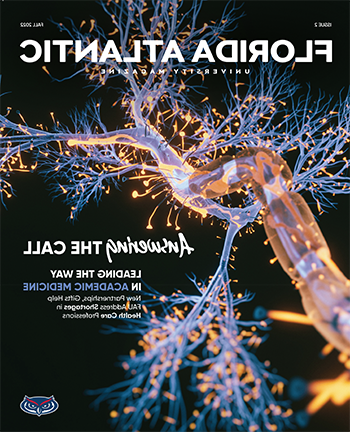11/18/2022
Building Bridges, Breaking Barriers in Health Care
Answering Florida’s Call for a New Generation of Doctors, Nurses and More
This partnership marks the beginning of a transformative health network for our region. It is a true collaboration that brings together an already robust health care infrastructure to fortify our health care workforce and ultimately save lives and find cures for diseases.”
— Brad Levine, chair of the FAU Board of Trustees
In 2020, the Kaiser Family Foundation ranked states based on the number of communities that face health professional shortages. Florida is ranked No. 5 and is expected to be short 17,924 physicians and more than 59,000 nurses by the year 2035. The good news is that Florida Atlantic University is addressing these looming and daunting shortages with innovative programs and strategic alliances.
Home to more than 3.2 million people, Broward, Palm Beach and Martin counties lacked a dominant health care system like those in many comparable metropolitan areas. Until now.
The newly launched FAU Health Network is an unprecedented regional partnership established to address critical workforce pressures through enhanced medical education programs, accelerated medical research innovation, and access to clinical trials — all while continuing unrivaled levels of patient care.
The network also was created to maximize interactions between FAU’s colleges including nursing, medicine, science, engineering and computer science, education, business, social work and arts and letters to expand the ability to train the needed workforce in an interprofessional environment.
The FAU Health Network’s regional partners represent leading hospitals, health care systems, universities, colleges, health care districts and nonprofit organizations that provide care to underserved populations in Broward, Palm Beach and Martin counties.
“Florida has a growing need for more new physicians, nurses and other patient care-related roles, such as medical and nursing assistants, technicians and social workers,” said Julie Pilitsis, M.D., Ph.D., dean and vice president for medical affairs, FAU Charles E. Schmidt College of Medicine. “The FAU Health Network transcends the competitive landscape through education and research collaborations between our stellar public and private academic and medical partners. Together, we are answering Florida’s call for the next generation of doctors, nurses and more.”
Preceding the FAU Health Network, leaders at FAU and the Schmidt College of Medicine wanted to ensure that the region would have an adequate and well-trained physician workforce. As such, more than a decade ago, they created the FAU Schmidt College of Medicine Graduate Medical Education (GME) Consortium to establish residency programs in specialties that would serve their communities.
FAU and its GME Consortium partners, Baptist Health South Florida’s Bethesda Hospital and Boca Raton Regional Hospital, and Tenet Health’s Delray Medical Center, St. Mary’s Medical Center and West Boca Medical Center, have made great advances in helping to address Florida’s physician shortages through its five residency and four fellowship programs. More than 177 resident physicians and fellows go through these FAU programs each year.
Since the inception of the first residency program in internal medicine in 2014, approximately 200 physicians have graduated from these programs to practice specialties in internal medicine, surgery, emergency medicine, psychiatry, neurology, vascular surgery, cardiology, geriatric medicine, and hospice and palliative medicine. Approximately 50 percent of all graduates end up practicing in Florida.
On the nursing front, FAU’s Christine E. Lynn College of Nursing is ahead of the curve in identifying problems and finding solutions for nursing shortages with innovative programs and partnerships. Early on in the COVID-19 pandemic, the college teamed up with Cross Country Healthcare, Inc., a leading provider of advisory and workforce solutions, to offer monthly webinars to share information and tips on self-care to address compassion fatigue. Because of the trends they saw, they decided to develop and conduct joint annual surveys.
The most recent national survey in September of nearly 2,000 employed and student nurses showed that overall, nurses remain passionate about patient care, citing helping people through meaningful work (66 percent), but highlighted areas of dissatisfaction and ongoing industry challenges, including pay rates/compensation (86 percent), staff shortages (53 percent), stress (39 percent) and burnout (35 percent) as the top career dissatisfiers facing the profession.
Importantly, results from the survey also provided very clear and specific areas for improvement and pinpointed areas of change that nurses believe would positively affect the profession.
If you would like more information, please contact us at dorcommunications@zzx007.com.

